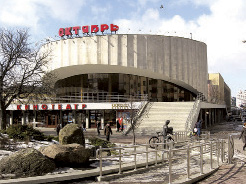January 30th. In 1895, Kirill Orlovsky was born in the village of Myshkovichi, in the Minsk Region’s Bobruisk District. He helped lead Belarus’ partisan movement and became a USSR Hero. From 1944, he headed Rassvet collective farm, which became a major, many-branch farm.
January 31st. In 1909, USSR Hero Semen Azarov was born in the village of Vileika, in the Chausy District. During the Great Patriotic War, his regiment performed bravely, fighting near Leningrad and in Karelia. He died in battle, in 1942.
February 1st. In 1972, weightlifter Sergey Lavrenov was born — an Honoured Master of Sports of Belarus, a USSR Master of Sports (international class) and a bronze medallist at the 27th Olympic Games, held in Australia, in 2000.
February 2nd. In 1885, Russian Civil War hero Mikhail Frunze was born — an organiser of the Red Army and the first head of Minsk’s militia. Military reform was conducted from 1924-1925 under his guidance.
February 3rd. In 1955, Doctor of Medical Sciences, Professor Vladimir Zharkov was born. From 1980, the oncologist worked at the Scientific-Research Institute of Oncology and Medical Radiology.
February 4th. In 1515, Mikołaj Radziwiłł Czarny was born — a state and military figure of the Grand Duchy of Lithuania. In his time, Brest and Nesvizh became influential centres, with printing houses opening in these cities.
February 5th. In 1889, art critic and historian of architecture Ivan Khozerov was born. From 1946, he headed the Monument Protection Department of the Architectural Issues Agency. He studied ancient architectural monuments: Polotsk’s Sofia Cathedral, Vitebsk’s Annunciation Church and frescoes.
January 30th. In 1924, Berezino State Reserve was established and, in 1978, it gained ‘biosphere’ status.
 January 30th. In 1975, Oktyabr Cinema opened in Minsk. Among the most beautiful in the city, it was designed by Belgosproekt Institute.
January 30th. In 1975, Oktyabr Cinema opened in Minsk. Among the most beautiful in the city, it was designed by Belgosproekt Institute.
January 31st. In 1919, Mogilev’s Governorate Local History Museum opened (now known as the Mogilev Regional Local History Museum).
January 31st. In 1957, the State Museum of the BSSR was set up in Minsk (now known as Belarus’ National History and Culture Museum).
February 1st. In 1922, the Belarusian Culture Institute was established, becoming the first scientific-research institution in the Republic. In 1982, it was reorganised as the BSSR Academy of Sciences.
February 1st. In 1929, the Belarusian Inquiry Communication Bureau began its wok in Minsk, on the basis of the postal-telegraph office.
February 1st. In 1944, the Belarusian headquarters of the partisan movement moved from Moscow to the village of Chenki (Gomel Region).
February 2nd. In 1898, a new church was consecrated in Mink’s suburbs, honouring Duke Alexander Nevsky, who was sainted.
February 2nd. In 1908, the first issue of Minsky Kurier was published. The newspaper ran until October 21st, 1908, and was then revived in April, 2011.
February 2nd. In 1945, the Belarusian Forestry-Technical Institute moved from Gomel to Minsk (known as the Belarusian Technological Institute since 1961 and the Belarusian State Technological University since 1993).
February 3rd. In 1493, the Zhirovichi Mother of God icon appeared: one of Belarus’ major Christian relics, revered by Russian and Greek Orthodox believers. It is currently housed at Zhirovichi Monastery, which was built on the site of the icon’s first appearance.
February 3rd. In 1992, Belarus established diplomatic relations with Korea.
February 4th. In 1971, the Geochemistry and Geophysics Institute opened at the BSSR Academy of Sciences.
February 4th. In 1977, Minsk launched metro construction.
February 4th. In 1989, the Saved Art Treasures Museum opened in Brest, becoming a branch of Brest Regional Local History Museum.
February 4th. In 2003, the Palestinian Embassy opened in Minsk.
February 5th. In 2004, Minsk’s Town Hall welcomed its first visitors, including officials, sportsmen and journalists attending a draw for Minsk’s Davis Cup match.











